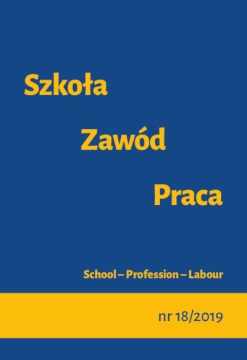Essay and interview as a technique for studying the course of a person’s professional life in the context of their professional development
DOI:
https://doi.org/10.34767/SZP.2019.02.13Keywords:
biographical method, essay, interview, work life course, professional developmentAbstract
In the research on the professional life of a man, the biographical method – thanks to the deepened introspection of the author of a statement (written or oral) – allows you to reach individual factors that create a kind of mosaic of dependencies that guide and modulate the course of their professional life. Essay and interview as techniques supporting this method, facilitate this individualized insight, exploring selected areas of human professional and non-professional activity at various stages of their development. The article presents (both) techniques used in research conducted among students of second degree studies in pedagogy (n = 97) and among those who were at the initial, middle and final stage of their professional career (n = 56). Analysis of the content of essays entitled „My path to profession” and structured interviews has enabled the identification of both recurring factors conducive to the transition of young people to the labour market, as well as personally conditioned factors activating persons at the initial stage of their professional career to take self-control actions. The article draws attention to the qualities of the qualitative paradigm in researching various contexts of human professional activity.
References
Babbie E., Badania społeczne w praktyce, Wyd. Nauk. PWN, Warszawa 2007.
Bańka A., Psychologiczne doradztwo karier, Print-B, Poznań 2007.
Cybal-Michalska A., Młodzież akademicka a kariera zawodowa, Impuls, Kraków 2014.
Czarnecki K., Profesjologia: nauka o zawodowym rozwoju człowieka, Humanitas – WSH, Sosnowiec 2010.
Czarnecki K., Karaś S., Profesjologia w zarysie: rozwój zawodowy człowieka, ITE, Radom 1996.
Gromkowska-Melosik A., Edukacja i (nie)równość społeczna kobiet. Studium dynamiki dostępu, Impuls, Kraków 2011.
Jastrzębski J., Literackie przygody uniwersalnego rozumu. O eseistyce Stanisława Lema, [w:] M. Wyka (red.), Polski esej. Studia, Universitas, Kraków 1991.
Kaliszewska M., Esej pedagogiczny w kształceniu akademickim. Teoria, praktyka i ocenianie, Uniw. Jana Kochanowskiego, Kielce 2009.
Kaszubski P., Esej – prostota angielskiej prozy w pigułce, „Polonistyka” 1994, nr 2.
Kvale S., Prowadzenie wywiadów, Wyd. Nauk. PWN, Warszawa 2011.
Piekarska A., Współczesne przeobrażenia wzorów karier kobiet i mężczyzn, „Acta Universitatis Lodziensis. Folia Sociologica” 2009, nr 34.
Piorunek M., Bieg życia zawodowego człowieka. Kontekst transformacji kulturowych, UAM, Poznań 2009.
Rubacha K., Metodologia badań nad edukacją, WAiP, Warszawa 2008.
Solarczyk-Ambrozik E., Nowe trendy w teoriach rozwoju karier. Implikacje dla poradnictwa kariery, „Studia Edukacyjne” 2015.
Sołoma L., Metody i techniki badań socjologicznych. Wybrane zagadnienia, UWM, Olsztyn 2002.
Włodarek J., Ziółkowski M., Teoretyczny i empiryczny status metody biograficznej we współczesnej socjologii, [w:] J. Włodarek, M. Ziółkowski (red.), Metoda biograficzna w socjologii, PWN, Warszawa 1990.

